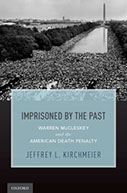Imprisoned by the Past: Warren McCleskey and the American Death Penalty

Author: Jeffrey L. Kirchmeier.
Publisher: New York: Oxford University Press, 2015. 448p.
Reviewer: James R. Acker | May 2015
In McCleskey v. Kemp, 481 U.S. 279 (1987), the Supreme Court deemed constitutionally irrelevant the results of a detailed empirical study completed by the late Professor David Baldus of the University of Iowa College of Law, which revealed dramatic racial differences in capital charging and sentencing decisions in Georgia in the mid- and late 1970s. Warren McCleskey, an African American, was convicted and sentenced to death in 1978 for murdering Frank Schlatt, a white police officer, during the course of an Atlanta furniture store robbery. McCleskey challenged his death sentence on Equal Protection and Eighth Amendment (cruel and unusual punishment) grounds, in reliance on Baldus’s research. The study, which Justice Powell’s majority opinion begrudgingly assumed was “statistically valid” without going so far as accepting that “racial considerations actually enter into any sentencing decisions in Georgia,” 481 U.S., at 291 n. 7, concluded that the odds of a death sentence being imposed under the state’s capital punishment law were 4.3 times higher in white-victim murder cases than in otherwise similar black-victim cases. The 5-4 decision upholding McCleskey’s death sentence in the face of the study’s findings effectively foreclosed future “as applied” challenges to capital punishment. The ruling signaled that the Court considered its policing of arbitrariness and discrimination in the death penalty’s administration to have ended with the enactment of legislation it had approved a decade earlier in Gregg v. Georgia, 428 U.S. 153 (1976) and companion cases. In his poignant dissenting opinion, Justice Brennan chastised the majority for ignoring the deep, unassailable cultural significance of the Baldus study’s stark findings:
Evaluation of McCleskey’s evidence cannot rest solely on the numbers themselves. We must also ask whether the conclusion suggested by those numbers is consonant with our understanding of history and human experience. Georgia’s legacy of a race-conscious criminal justice system, as well as this Court’s own recognition of the persistent danger that racial attitudes may affect criminal proceedings, indicates that McCleskey’s claim is not a fanciful product of a mere statistical artifice. 481 U.S., at 328-329 (Brennan, J., dissenting).
Justice Brennan’s argument is embraced and fully developed in Jeffrey Kirchmeier’s Imprisoned by the Past: Warren McCleskey and the American Death Penalty. Kirchmeier, a professor at the City University of New York School of Law, has knitted a distinctive multi-thematic tapestry dark with the country’s legacy of slavery, racial discrimination, criminal injustice, and capital punishment. “[T]he foundations of a lynching society,” he contends, while interweaving a detailed account of McCleskey’s crime and punishment with a centuries-long exploration of race relations and American criminal justice, “remain[] embedded in a legal system imprisoned by the past” (p. 129).
Imprisoned by the Past is several books in one. Its discrete parts—covering the specifics of McCleskey’s life and his crime, the country’s historical and evolving death-penalty laws and practices, attention to the institutions of slavery, lynching, and Jim Crow laws, a detailed examination of Baldus’s study and what the Supreme Court made of it in its landmark ruling rejecting McCleskey’s claims, capital-punishment developments in the wake of McCleskey, the current, remarkable decline in the death penalty and what the future may hold, and more—offer something for everyone, from death-penalty neophytes to long-time students and scholars of capital punishment. The book is meticulously researched and dotted with fascinating details and anecdotes which complement and enrich the broad-brush histories that ripple through the book’s separate sections.
Imprisoned by the Past begins and ends with a portrait of Marietta, Georgia, where Warren McCleskey was born and raised. Marietta was burned to the ground in 1864 during General William Tecumseh Sherman’s march to the sea at the close of the Civil War. A half-century later, the city was home to Mary Phagan, a 13-year old girl who was murdered in 1915 while working in an Atlanta pencil factory managed by Leo Frank. Frank, Jewish, and a transplanted Northerner, was convicted of the shocking crime in a trial inflamed by community antipathies. He immediately was sentenced to death. Concerned that anti-Semitism had hijacked the trial and fueled Frank’s conviction, Governor John M. Slaton commuted Frank’s death sentence to life imprisonment. An angry mob of Marietta citizens thereupon stormed the prison where Frank was incarcerated, seized him, transported him back to Marietta, and hanged him from a tree. His body was left on display and a crowd of several thousand later gathered to take pictures and collect souvenirs. By 1948, when Warren McCleskey was born in Marietta, schoolsand lunch counters were still racially segregated. Today, the city proudly harbors a Gone With the Wind museum. The Georgia State Flag, only recently purged of symbols of the old Confederacy, flies atop the Marietta Courthouse. While Georgia celebrates Martin Luther King, Jr., Day, it also recognizes Robert E. Lee’s Birthday and Confederate Memorial Day.
Marietta has changed significantly with the passage of time. In Kirchmeier’s view, it nevertheless remains a city where “the effects of the Leo Frank lynching never disappeared” (p. 308). Circling back to McCleskey’s case, Kirchmeier argues that “the town, the state, and the nation have yet to confront the legacy of the evidence presented in [the Baldus study]. These remnants of history linger on in the nation’s death penalty” (pp. 310-311). In many distressing ways, and noting in particular “that race still plays a role in capital sentencing, as do other arbitrary factors,” Kirchmeier makes a persuasive case that an examination of the death penalty today reveals that “the past is still present” (p. 314). Imprisoned by the Past, Kirchmeier’s significant contribution to capital punishment scholarship, impressively marshals a compelling body of historical and contemporary evidence in support of that sobering conclusion.
James R. Acker, Distinguished Teaching Professor, School of Criminal Justice, University at Albany


